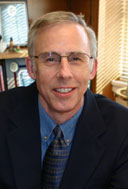ECONOMICALLY SPEAKING

photo courtesy of University of Florida
A while back, I told you about the concept of TINSTAAFL. Remember? “In my college macro economics class, Sanford V. Berg taught us the concept of TINSTAAFL (pronounced like waffle, got it?). We’ve all heard about this concept. Class, repeat after me, “There Is No Such Thing As A Free Lunch.” But did the great Sanford Berg steer me wrong? While on vacation, I thought about this concept of ‘Free.’ I guess it occurred to me because in one day, I observed three different kinds of Free…”
Lo and behold and much to my surprise, I got an email from none other than the honorable Professor Berg himself. He found the post by googling and offered me his professorial economic wisdom. I’d like to share it with all of you. So without further adieu, ladies and gentlemen… Distinguished Service Professor Sanford V. Berg
“On the first day of almost every course I teach I ask students what TINSTAFFL stands for. Ultimately, someone volunteers the phrase, I “There is no such thing as a free lunch.” Of course that’s a key insight from Economics, so we pay brief homage to the phrase. In recent years, I have proceeded to ask students what TBTILAF stands for. Responses to this question are a bit slower in coming, but ultimately someone volunteers, “The best things in life are free.” We then have to figure out which of the two will serve as the operating principle for the course.
So we talk about who taught us that TBTILAF and what those “best things” are. Students generally suggest: relationships, love, integrity, family, beauty, and walks on the beach. Then I respond that none of those aspects of life are truly free. All have opportunity costs—something is given up to obtain those valued experiences. So I re-state the phrase as “The best things in life are non-monetary” (TBTILAN). Ultimately, economics and ethics are not in conflict. The former describes how choices are made, given the values and objectives of decision-makers (consumers, workers, managers, or stockholders). The latter asks us whether our actions are in line with core principles. Clearly, the "best things" (love, integrity, meaning) take time to develop. So we are always making decisions that affect others and ourselves. Economics is not about our spiritual journey, but without some grounding in these activities and traditions that give life meaning, we are apt to forget that life is far more than possessing material goods and having a pleasant appearance.
We know that, "What we are able to count is not all that counts." Ultimately, “The best things in life are not things.” (TBTILANT)”
{Applause}
Thanks Professor Berg. It was great to hear from you.
Todd Moser a/k/a “Plantation”
UF Class of ‘85


3 Comments:
How cool that your professor found you!
TBTILANT!
By Elizabeth Krecker, at 12:30 AM, September 02, 2006
Elizabeth Krecker, at 12:30 AM, September 02, 2006
Wise man.
By Buffy, at 9:32 AM, September 05, 2006
Buffy, at 9:32 AM, September 05, 2006
Love that!
By Anonymous, at 10:19 AM, September 05, 2006
Anonymous, at 10:19 AM, September 05, 2006
Post a Comment
<< Home